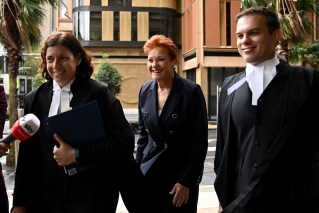Labor’s integrity body under fire for ‘major red flag’
Key independent MPs have raised a “major red flag” as Labor revealed more about its plans for a new federal anti-corruption body.
Attorney-General Mark Dreyfus briefed the Labor caucus on the legislation on Tuesday morning and will introduce the bill to parliament on Wednesday.
It will cost $262 million over four years to ensure it is resourced well enough to improve integrity in public life. Mr Dreyfus said that was $90 million more than the former Coalition government had committed.
But the legislation hasn’t pleased everyone, with public hearings only to be held in “exceptional circumstances”, a particularly high legal bar.
“The threshold is too high and could result in very few public hearings,” the MP for Warringah, Zali Steggall, tweeted on Tuesday.
“A public interest test is better.”
Tweet from @zalisteggall
Another independent MP, Kooyong’s Monique Ryan, was also quick to express concerns.
” ‘Exceptional circumstances’ is a very high bar for public hearings in the NACC,” she tweeted on Tuesday.
“It could cause delays due to challenges to the investigative process. Sunlight is a very good disinfectant.”
Mr Dreyfus said the public hearings test would prevent unwanted reputational damage felt by those needing to appear in front of the committee.
“The commission should be required to determine that it is in the public interest that a hearing be in public
“Public hearings … are more difficult to conduct, they raise questions about reputational harm, which are not faced when you hold private hearings and that is why most of these commissions’ work has been done in private.”
Labor has the numbers for the bill to pass the lower house.
But it will need the support of the Greens in the Senate, if the opposition does not back the bill. They also want the commission to have a broad scope to hold its hearings in public.
Mr Dreyfus also confirmed legal costs of any MP or public official facing an investigation would be covered by the taxpayer.
The laws will provide for a parliamentary committee to review and publicly report on the commission’s budget.
The body, to be known as the National Anti-Corruption Commission, will investigate serious or systemic corrupt conduct across the entire federal public sector.
Mr Dreyfus said design principles would include a broad jurisdiction covering ministers, parliamentarians and their staff, statutory office holders, employees of all government entities and government contractors.
It will be independent of government with discretion to start inquiries on its own initiative or in response to referrals, including from whistleblowers and the public.
While the government has pointed to scandals of the former Coalition government as evidence an anti-corruption commission is needed, Mr Dreyfus said it wouldn’t be appropriate for him to refer them to the commission. He said the public shouldn’t fear the new commission would be used as a vehicle for payback.
“It’s going to complete the set … we’ve got a corruption commission in every state and territory,” he said.
It will have retrospective powers to investigate matters of its choosing.
The commission will be empowered to make findings of fact, including findings of corrupt conduct and refer findings that could constitute criminal conduct to the Australian Federal Police or the Commonwealth Director of Public Prosecutions.
Findings will be subject to judicial review, with strong protections in place for whistleblowers and exemptions for journalists to protect the identity of their sources.
Mr Dreyfus said Australia’s whistleblower protection laws needed updating generally, but added there will be specific protections in the new bill.
The coalition have indicated they would support the establishment of a national commission, but haven’t tied themselves to Labor’s model.
Labor is aiming to have the legislation passed this year, but committee processes and Senate procedure could delay the legislation passing until March.
-with AAP








